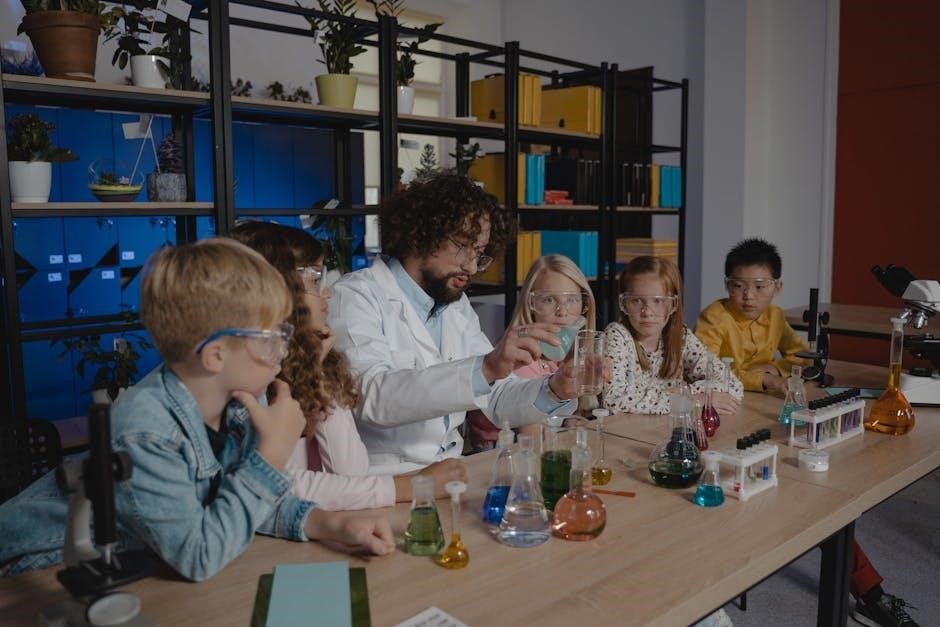scientific method quiz with answers pdf
A scientific method quiz with answers PDF is a valuable resource for testing knowledge of key concepts, steps, and terminology in the scientific method. The quizzes, available for free download, cover essential topics such as hypotheses, experiments, variables, and laboratory safety. They are designed to help students and educators assess understanding and prepare for exams or discussions on scientific methodology. These quizzes often include multiple-choice questions, true/false statements, and short-answer sections to ensure a comprehensive evaluation of skills. By practicing with these materials, learners can gain confidence in applying the scientific method to real-world problems and experiments.
Overview of the Scientific Method
The scientific method is a systematic process used to explore and understand phenomena through observation, experimentation, and evidence-based conclusions. It begins with asking a question, followed by research, hypothesis formulation, experimentation, analysis, and drawing conclusions. Quizzes on the scientific method, such as those found in PDF formats, are designed to assess understanding of these steps and related concepts like variables, hypotheses, and lab safety. These resources often include multiple-choice questions, true/false statements, and short-answer sections, making them ideal for students and educators to test knowledge and prepare for exams or discussions on scientific methodology.
Importance of Quizzes in Understanding the Scientific Method
Quizzes are an essential tool for reinforcing understanding of the scientific method. They help students identify knowledge gaps and solidify concepts like hypotheses, variables, and experimental design. By testing knowledge through multiple-choice questions, true/false statements, and short-answer sections, quizzes ensure a comprehensive grasp of scientific principles. They also encourage active learning and critical thinking, preparing students for real-world applications of the scientific method. Regular quiz practice enhances retention and confidence, making it easier to apply these methods in experiments and problem-solving scenarios. Additionally, quizzes provide immediate feedback, allowing learners to track their progress and improve effectively.

Key Concepts in the Scientific Method
The scientific method involves systematic steps like observation, hypothesis, experimentation, and conclusion. Key concepts include variables, controlled experiments, and the distinction between hypotheses, theories, and laws.
Definition and Steps of the Scientific Method
The scientific method is a systematic process for exploring phenomena and answering questions. It begins with observation, followed by forming a question and hypothesis. The steps include experimentation to test the hypothesis, collecting and analyzing data, and drawing conclusions. This structured approach ensures objectivity and reproducibility. Understanding these steps is fundamental for quizzes, as they often assess the ability to apply the method logically. By mastering these concepts, students can confidently approach scientific challenges and excel in related assessments. The method’s clarity and rigor make it a cornerstone of scientific inquiry and education.
Difference Between Hypothesis, Theory, and Law
A hypothesis is a specific, testable explanation for a phenomenon, often developed to answer a scientific question. It is tentative and must be validated through experimentation. A theory, on the other hand, is a well-substantiated explanation for a broad range of observations, supported by extensive evidence. It is not a guess but a framework that explains and predicts phenomena. A law describes a consistent pattern or relationship in nature, such as the law of gravity. Unlike theories, laws do not explain why something happens, but rather describe what happens. Quizzes often highlight these distinctions to ensure clarity in scientific understanding.

Components of a Scientific Method Quiz
A scientific method quiz typically includes multiple-choice questions, true/false statements, and short-answer sections. It covers key terms, steps, and applications of the scientific method, ensuring a comprehensive understanding of its principles and practical uses. The quizzes often feature sections on identifying variables, experimental design, and laboratory safety, making them a valuable tool for assessing knowledge and preparing for further studies in scientific methodology. The downloadable PDF format allows for convenient access and self-paced learning, enhancing overall engagement with the subject matter.
Multiple Choice Questions (MCQs) on Key Terms
Multiple choice questions (MCQs) on key terms are a fundamental part of scientific method quizzes. These questions test understanding of essential concepts such as hypothesis, theory, and law. They also cover variables, experimental design, and laboratory safety. MCQs provide a clear and structured way to assess knowledge, offering options that challenge learners to distinguish between correct and incorrect definitions or applications. Many quizzes include answer keys, allowing for self-assessment and review. This format is particularly useful for identifying areas where further study is needed, ensuring a strong grasp of foundational scientific principles. They are often included in downloadable PDFs for convenience.
True/False Questions on Scientific Methodology
True/false questions on scientific methodology are designed to assess understanding of key principles and concepts. These questions focus on statements about the scientific method, such as the definition of a hypothesis, the role of variables, and laboratory safety practices. They require learners to critically evaluate whether each statement is accurate or incorrect. True/false questions are effective for reinforcing knowledge and identifying misconceptions. Many quizzes include answer keys, enabling self-assessment and review. This format is particularly useful for preparing for exams or discussions, as it helps learners master foundational concepts and apply them correctly in scientific contexts.
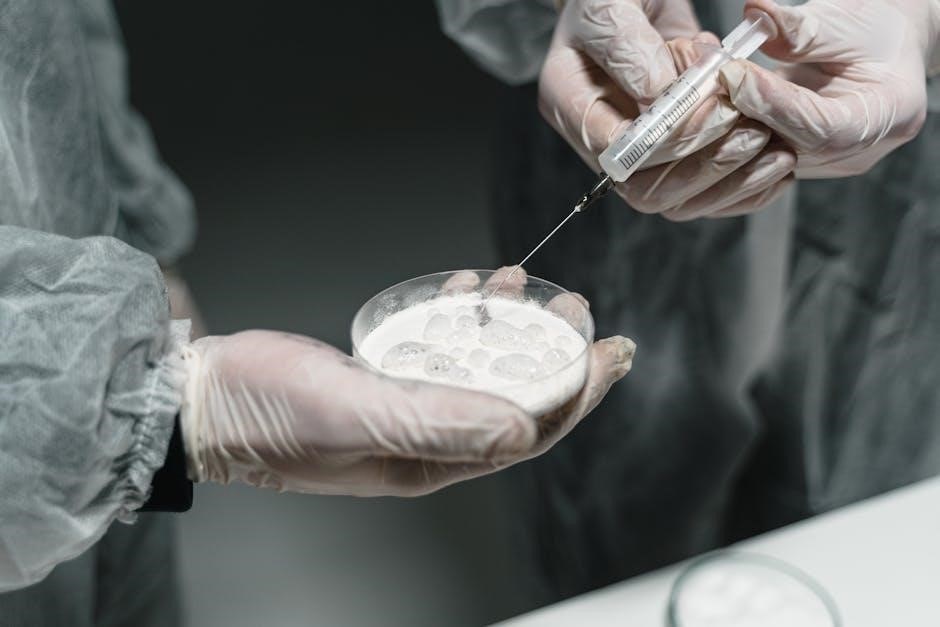
Variables in Scientific Experiments
Variables in experiments include independent, dependent, and controlled types. Understanding their roles is crucial for valid results. Quizzes often test knowledge of variable identification and manipulation for experimental design and cause-effect analysis.
Types of Variables: Independent, Dependent, and Controlled
In scientific experiments, variables are categorized into three main types: independent, dependent, and controlled. The independent variable is the factor manipulated by the researcher to observe its effect. The dependent variable is the outcome measured in response to the independent variable. Controlled variables are kept constant to ensure the experiment’s reliability and validity. Understanding these variables is essential for designing experiments and drawing accurate conclusions. Quizzes on the scientific method often include questions to test comprehension of variable types and their roles in experimental design, helping learners master this fundamental concept.
Identifying Variables in Experimental Design
Identifying variables in experimental design is crucial for ensuring the validity and reliability of scientific investigations; The independent variable is the factor intentionally changed by the researcher, while the dependent variable is the outcome measured in response. Controlled variables, or constants, are factors held steady to prevent interference. Quizzes on the scientific method often include questions that test the ability to distinguish and identify these variables in different experimental scenarios. This skill is essential for designing experiments, analyzing data, and drawing accurate conclusions. Understanding variables is a fundamental part of conducting effective scientific research.
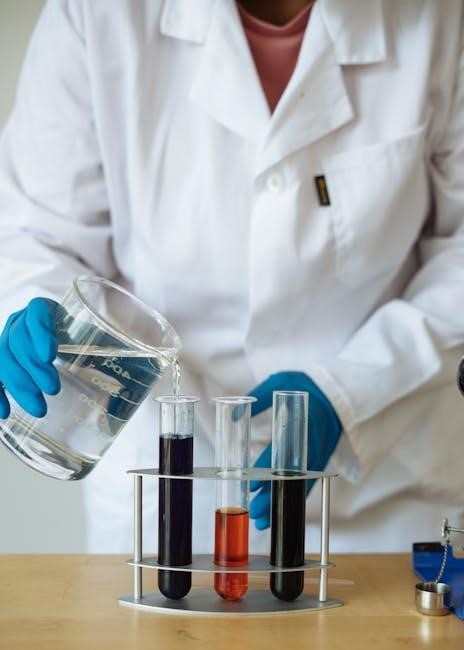
Hypothesis and Experimentation
A hypothesis is a testable answer to a scientific question, guiding experimentation. Experiments are designed to manipulate variables, testing the hypothesis and validating its accuracy through observable data.
Formulating a Testable Hypothesis
Formulating a testable hypothesis involves creating a specific, measurable statement that predicts the outcome of an experiment. It must be clear, concise, and falsifiable, allowing for validation or rejection through experimentation. A strong hypothesis identifies the independent and dependent variables and their expected relationship. For example, in an experiment testing mold growth on bread at different temperatures, a hypothesis might state: “Bread stored at room temperature will develop mold faster than bread refrigerated or incubated at high heat.” Ensuring the hypothesis is testable is crucial for scientific validity and reliable results.
Designing an Experiment to Test the Hypothesis
Designing an experiment to test a hypothesis involves creating a controlled setup to observe and measure outcomes. It requires identifying the independent variable (manipulated factor), dependent variable (observed outcome), and controlled variables (kept constant). For example, in an experiment testing mold growth on bread at different temperatures, the independent variable is temperature, the dependent variable is mold growth, and controlled variables include bread type and humidity. A well-designed experiment ensures reproducibility, minimizes bias, and allows for clear conclusions about the hypothesis. Proper data collection tools and a clear procedure are essential for valid results.
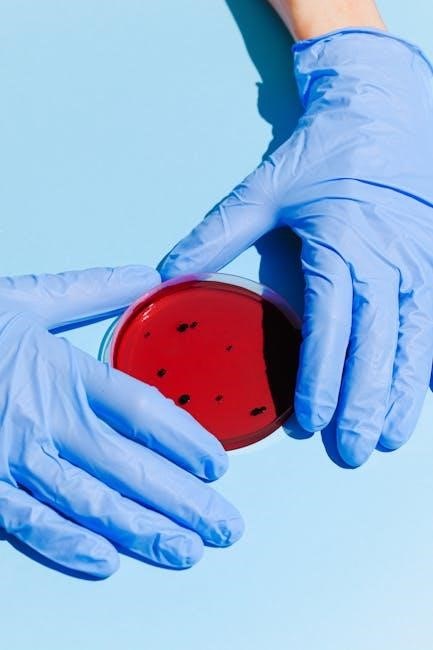
Laboratory Safety and Practices
Laboratory safety involves following protocols to minimize hazards. Common risks include broken glass, chemical spills, and improper equipment use. Precautions include wearing goggles, gloves, and lab coats.
Safe Laboratory Practices in Scientific Experiments
Safe laboratory practices are crucial to ensure the well-being of participants and the integrity of experiments. Key practices include wearing protective gear like goggles, gloves, and lab coats to prevent injuries. Proper handling of equipment, such as using tongs for hot objects and avoiding broken glass, minimizes risks. Chemicals should be stored and disposed of correctly, and experiments should be conducted in well-ventilated areas. Cleaning up spills immediately and following established protocols for procedures are essential. Additionally, being prepared for emergencies, like having a fire extinguisher nearby, ensures a secure environment for scientific exploration and learning.
Common Hazards and Precautions in Lab Settings
Lab settings often present hazards such as chemical spills, broken glass, and improper use of equipment. Precautions include wearing protective gear like goggles and gloves to prevent injuries. Handling chemicals requires careful reading of labels and use of fume hoods to avoid inhalation. Electrical equipment should be operated with caution to avoid shocks or fires. Open flames and hot surfaces demand attention to prevent burns. Proper storage of materials and immediate cleanup of spills reduce accident risks. Following safety protocols and being aware of emergency exits ensures a secure environment for conducting experiments safely and effectively.

Application of the Scientific Method
The scientific method is widely applied in real-world scenarios, from medical research to environmental studies. It aids in solving everyday problems and fosters critical thinking, enabling systematic approaches to challenges across various fields, promoting innovation and reliable outcomes.
Real-World Examples of the Scientific Method in Action
The scientific method is applied in various real-world scenarios, such as medical research, environmental studies, and agricultural experiments. For instance, scientists use it to develop new vaccines, study climate change, or improve crop yields. In one example, Bellami conducted an experiment to determine the optimal temperature for mold growth on bread, testing different conditions like room temperature, refrigeration, and warm incubation. Such practical applications demonstrate how the scientific method helps solve everyday problems and advance knowledge. These examples are often featured in quizzes to illustrate the method’s relevance and effectiveness in real-life situations, making learning engaging and relatable.
Case Studies of Successful Scientific Experiments
Case studies of successful scientific experiments provide practical insights into the application of the scientific method. For example, Bellami’s experiment on mold growth at different temperatures demonstrates a clear application of the method. She observed mold growth, formulated a hypothesis, tested variables, and drew conclusions. Such case studies are often included in quizzes to illustrate how the scientific method leads to valid results; They highlight the importance of systematic observation, experimentation, and analysis in resolving scientific questions. These examples serve as valuable learning tools, helping students understand how to design and execute experiments effectively in real-world scenarios.
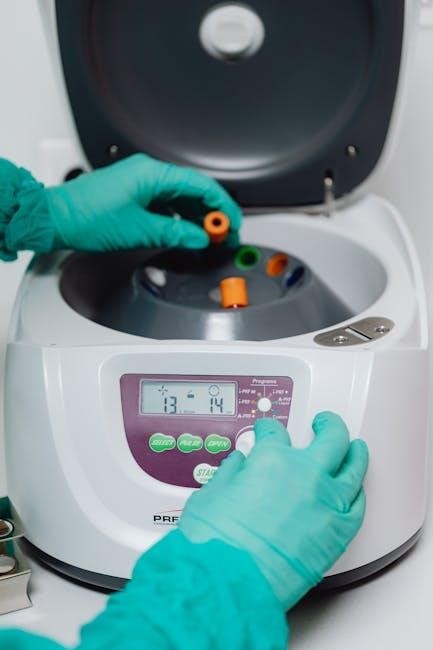
Preparing for a Scientific Method Quiz
Preparing for a scientific method quiz involves reviewing key concepts, practicing with sample questions, and understanding the steps involved in the scientific process. Utilize study guides, online resources, and quizzes with answers to test your knowledge and identify areas for improvement. Focus on understanding hypotheses, variables, and experimental design to build a strong foundation. Regular practice ensures confidence and readiness for assessments, helping you apply the scientific method effectively in various scenarios.
Reviewing Key Concepts and Steps
Reviewing key concepts and steps is essential for mastering the scientific method. Start by understanding the process, from asking a question to drawing a conclusion. Focus on terminology like hypothesis, theory, and law, as well as variables—Independent, Dependent, and Controlled. Familiarize yourself with experimental design and laboratory safety practices. Utilize scientific method quizzes with answers to test your knowledge and identify gaps. Pay attention to steps like observation, research, and analysis. Ensure you can differentiate between concepts and apply them correctly. Regular review helps reinforce learning and prepares you for more complex scientific inquiries and experiments.
Practicing with Sample Questions and Answers
Practicing with sample questions and answers is a proven way to enhance understanding of the scientific method. Scientific method quizzes with answers PDF provide a structured approach to test knowledge and identify areas for improvement. These resources often include multiple-choice questions, true/false statements, and short-answer prompts. They cover key topics like hypotheses, variables, and experimental design. By reviewing correct answers, learners can clarify misconceptions and strengthen their grasp of the scientific process. Regular practice with sample questions helps build confidence and ensures readiness for exams or discussions on scientific methodology. It’s an effective way to reinforce learning and retention of essential concepts.
